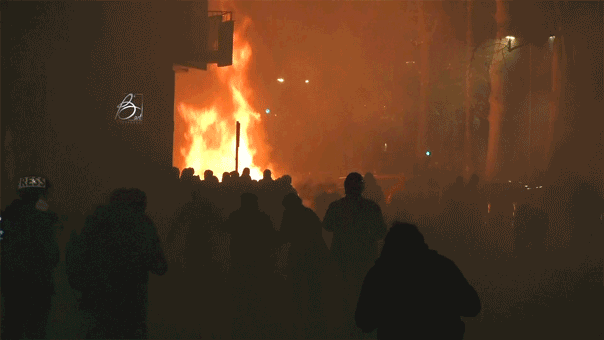OSLO, Norway – With his Nobel Peace Prize diploma placed in an empty chair, imprisoned Chinese dissident Liu Xiaobo was given a standing ovation at the award ceremony Friday as dignitaries demanded his release.
It was the first time in 74 years the prestigious $1.4 million award was not handed over, because Liu is serving an 11-year sentence in China on subversion charges for urging sweeping changes to Beijing's one-party communist political system.
China was infuriated when the 54-year-old literary critic won, describing the award as an attack on its political and legal system. Authorities have placed Liu's supporters, including his wife, Liu Xia, under house arrest to prevent anyone from picking up his prize.
In China, both CNN and BBC TV channels went black at 8 p.m. local time for nearly an hour, exactly when the Oslo ceremony took place. Security outside Liu's Beijing apartment was heavy and several dozen journalists were herded by police to a cordoned-off area.
In his speech, Norwegian Nobel Committee Chairman Thorbjorn Jagland called for Liu's release, receiving an unusual standing ovation at the international gathering.
"He has not done anything wrong. He must be released," Jagland said. He noted that neither Liu nor his closest relatives were able to attend the ceremony. "This fact alone shows that the award was necessary and appropriate."
He placed Liu's Nobel diploma on the empty chair marking Liu's absence.
Norwegian actress Liv Ullman read Liu's final statement, "I Have No Enemies," which he delivered in a Chinese court in 2009 before he was jailed.
The Chinese Foreign Ministry described the award as a "political farce," saying it reflected Cold War mentality and infringed upon China's judicial sovereignty.
"(It) does not represent the wish of the majority of the people in the world, particularly that of the developing countries," ministry spokeswoman Jiang Yu said in Beijing.
In Washington, President Barack Obama said he regretted that Liu and his wife were not allowed to go to the ceremony as he and first lady Michelle Obama did when he won the peace prize last year.
"Liu Xiaobo is far more deserving of this award than I was," he said.
Also Friday, a group of Nobel laureates, including former South African President F.W. de Klerk, Elie Wiesel and John Hume, offered to mediate with the Chinese government for Liu's early release.
The last time a Nobel Peace Prize was not handed out was in 1936, when Adolf Hitler prevented German pacifist Carl von Ossietzky from accepting his award. The prize can be collected only by the laureate or close family members.
China had pressured foreign diplomats to stay away from the Nobel ceremony, with 17 other countries joining their boycott, including Russia, Pakistan, Iran, Venezuela and Cuba. At least 46 of the 65 countries with embassies in Oslo accepted invitations. Serbia, which previously said it would stay away, changed its mind and attended.
Some 1,000 guests, including ambassadors, royalty and other VIPs sat solemnly in atrium hall of Oslo's modernist City Hall for the ceremony.
U.S. House Speaker Nancy Pelosi, who attended with U.S. Ambassador Barry White, told The Associated Press that it was "an honor" for her to be there.
"It is really a joy of my official life. For decades we have worked for human rights in China and Liu Xiaobo has been a hero to all of us," she said.
About 100 Chinese dissidents in exile and some activists from Hong Kong also attended.
Chinese dissident Wan Yanhai, the only one on a list of 140 activists in China invited by Liu's wife to attend the ceremony, said the jubilation felt by many at Liu's honor will be tinged with sadness.
"I believe many people will cry, because everything he has done did not do any harm to the country and the people in the world. He just fulfilled his responsibility," Wan told AP. "But he suffered a lot of pain for his speeches, journals and advocacy of rights."
Wan managed to travel to Oslo because he fled to the United States in May after Chinese authorities increased their harassment of his AIDS advocacy group.
Before the ceremony, 2,000 schoolchildren gathered outside city hall in a display of appreciation for Liu. Some handed letters to Jagland, hoping he could convey their greetings to the jailed laureate.
Jagland said awarding the prize to Liu was not "a prize against China," and he urged Beijing that as a world power it "should become used to being debated and criticized."
Outside Parliament, the Norwegian-Chinese Association held a pro-China rally with a handful of people proclaiming the committee had made a mistake in awarding the prize to Liu.
In the Swedish capital of Stockholm, the other Nobel laureates were being honored in a separate ceremony Friday. Winners in literature, physics, chemistry and economics were receiving their awards from Sweden's King Carl XVI Gustaf.
China's furious assault on Liu's award has reached proportions last seen during the Soviet and Nazi regimes. But even Cold War dissidents Russian Andrei Sakharov and Lech Walesa of Poland were able to have their wives collect the prizes for them. Myanmar democracy activist Aung San Suu Kyi's award was accepted by her 18-year-old son in 1991.
Soviet authorities forced Russian writer Boris Pasternak to decline his 1958 literature prize and in 1975 barred Sakharov from collecting the 1975 peace prize and stripped him of his honorary titles. Pasternak's wife was able to accept the peace prize for him because she was abroad before the prize announcement.
French writer Jean-Paul Sartre declined the 1964 literature prize because he had consistently declined all official honors. In 1973, Le Duc Tho of Vietnam, who was awarded the peace prize jointly with U.S. Secretary of State Henry Kissinger, said he could not accept it, citing the war in Vietnam.








































